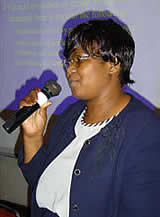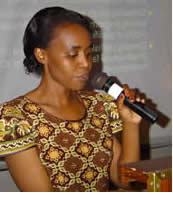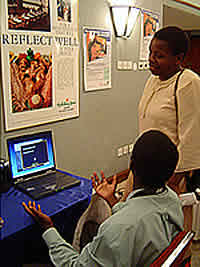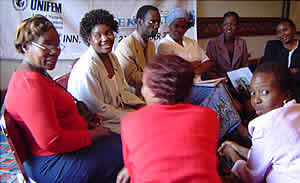|
Back to Index
Report
on the National ICT Strategy and Policy Workshop
Taurai Maduna,
Kubatana.net
October 22, 2004
Summary
report on National ICT held at the HICC - August 31, 2004
  The
E-Knowledge for women in Southern Africa (EKOWISA) in conjuction
with the United Nations Fund for Women (UNIFEM) hosted the National
ICT Strategy and Policy workshop in Harare on October 21, 2004. The
E-Knowledge for women in Southern Africa (EKOWISA) in conjuction
with the United Nations Fund for Women (UNIFEM) hosted the National
ICT Strategy and Policy workshop in Harare on October 21, 2004.
The workshop
was attended by more than 80 delegates from civil society, government
departments and women in business. The main objective of the workshop
was to discuss the National ICT Policy and get recommendations that
will be included in the draft ICT policy.
The workshop
also focused on how the National ICT Policy should reflect the main
issues affecting women and their access to ICT's in their communities.
The programme
began with welcome remarks by Ms Mbambo, chairperson of EKOWISA
followed by presentations.
Ms N Manzini, the Regional Director of the United
Nations Fund for Women (UNIFEM) thanked Margaret Zunguze and
her team at EKOWISA for the wonderful work they where doing in promoting
the use of ICT's amongst women in Southern Africa. Ms Manzini said
it was important that women where meeting to discuss the National
ICT Policy before the draft policy was compiled. She said policies
should be gender balanced and inputs from a gender perspective where
very useful.
  The
Director of the United Nations Information Department, was represented
by Ms Tafadzwa Mumba. In her presentation
Ms Mumba outlined the WSIS process, the declaration and plan of
action. She said there was need to the scrap the Geneva Plan of
Action because it was vague. The
Director of the United Nations Information Department, was represented
by Ms Tafadzwa Mumba. In her presentation
Ms Mumba outlined the WSIS process, the declaration and plan of
action. She said there was need to the scrap the Geneva Plan of
Action because it was vague.
The workshop
was officially opened by a representative from the Ministry of Youth,
Gender and Employment Creation who highlighted government's commitment
to the creation of a National ICT Policy.
Mr Dumisani
Ngwenya, Project Coordinator of the National Information and Communication
Technology Project. He spoke about the National
ICT Project, which was set up to create a sustainable knowledge
society/economy in Zimbabwe through the effective use of Information
and Communication Technologies (ICT).
The National
ICT Project is funded by the United Nations Development Programme
(UNDP) and executed through the Department of Science and Technology
Development at the National University of Science and Technology
(NUST). The intended final project outcome is the National ICT Strategy
Document being formulated and linked to the national Millennium
Development Goals. The project will achieve this by undertaking
several activities including readiness surveys, conducting awareness
campaigns and organizing stakeholder workshops. The diagnostic surveys
will address sectors of the economy and society such as: e-Commerce,
e-Education and Training, e-Government, e-Public Service, e-Mining,
e-Health, e-Agriculture, e-Tourism, e-Manufacturing, e-ICT.
Dr Dlodlo from
NUST presented a paper entitled "National
ICT process and the gender component". Dr Dlodlo said her paper
was meant to stimulate debate on ICT's visa vis gender equality.
She further added that at the moment ICT's are labelled as a 'non'-woman
sector.
  After
each presentations, delegates where asked to comment or give their
thoughts on the National ICT Project. Some of the concerns raised
by the delegates included the following: After
each presentations, delegates where asked to comment or give their
thoughts on the National ICT Project. Some of the concerns raised
by the delegates included the following:
- Although
good policies were being drafted they are useless if the implementation
is not done effectively.
- Government
has to do more to commit it'self to the National ICT Policy
- Focus on
women should not only refer to rural women but also those in the
urban areas.
- The National
ICT Project was not doing enough to raise awareness of the project
by the general public.
After the presentations,
delegates where divided into groups, that were meant to discuss
and give policy recommendations/guidelines to the diagnostic surveys
being conducted by the National ICT project.
The groups were
meant to discuss various issues, which include, appropriate technology,
relevant content, socio-cultural factors, legal and regulatory framework
and political will.
 Discussions
from the groups where then presented in a plenary session. Some
of the presentations made during the plenary highlighted that there
was need for a sound economic environment that allows investors
and potential investors to invest in ICT's. There were also calls
that Government should do away with laws that stifle the use or
growth of ICTs. The deregulation of monopolies and an increase in
competion was seen as a move that would create a conjucive environment
in the growth of ICTs. Discussions
from the groups where then presented in a plenary session. Some
of the presentations made during the plenary highlighted that there
was need for a sound economic environment that allows investors
and potential investors to invest in ICT's. There were also calls
that Government should do away with laws that stifle the use or
growth of ICTs. The deregulation of monopolies and an increase in
competion was seen as a move that would create a conjucive environment
in the growth of ICTs.
  Apart
from the presentations and disucussions, the workshop provided an
opportunity for delegates to interact with women in business who
have benefited from the Technological Information Promotion System
(TIPS) programme. The TIPS is a specialized network that provides
support and information to business enterprises, particularly small-
and medium-sized enterprises. The main goal of TIPS is to promote
the potential and competitiveness of small and medium-sized enterprises
(SMEs) in developing countries. Apart
from the presentations and disucussions, the workshop provided an
opportunity for delegates to interact with women in business who
have benefited from the Technological Information Promotion System
(TIPS) programme. The TIPS is a specialized network that provides
support and information to business enterprises, particularly small-
and medium-sized enterprises. The main goal of TIPS is to promote
the potential and competitiveness of small and medium-sized enterprises
(SMEs) in developing countries.
Women who are
involved in various business projects which include cross border
trading, cateringand events management highlighted the need to learn
more about ICTs. The women expressed a desire to learn more about
ICTs to enable hem to improve the way they do business and at the
same time allow them to explore new markets for their goods.
A report on
the workshop with recommendations that would be put forward to the
National ICT Project will be compiled by EKOWISA.
Visit the EKOWIZA
fact sheet
Please credit www.kubatana.net if you make use of material from this website.
This work is licensed under a Creative Commons License unless stated otherwise.
TOP
|

